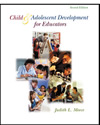

 Child and Adolescent Development for Educators, 2/e Cognitive Development: Information Processing and Intelligence Theories Multiple Choice Quiz |
 2002 McGraw-Hill Higher Education
2002 McGraw-Hill Higher EducationAny use is subject to the Terms of Use and Privacy Notice.
McGraw-Hill Higher Education is one of the many fine businesses of The McGraw-Hill Companies.